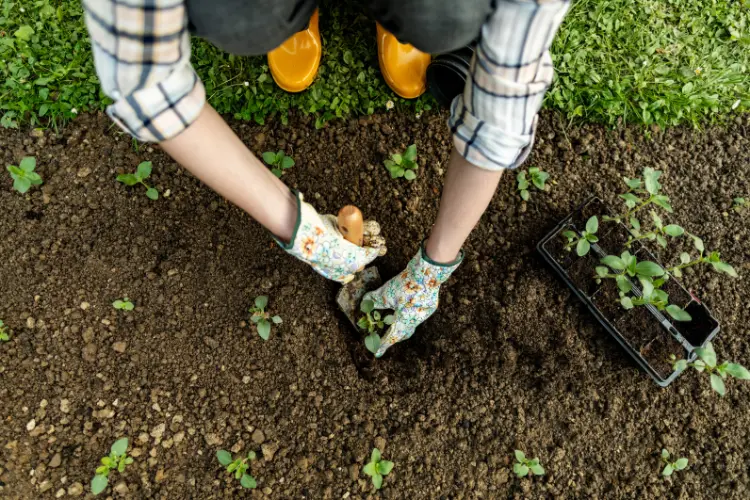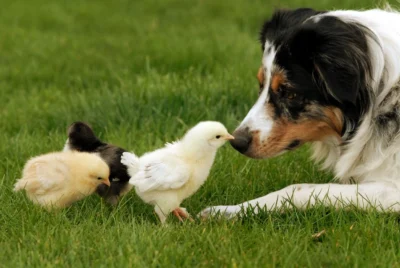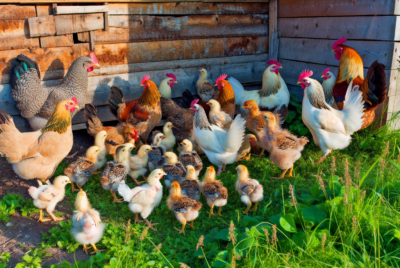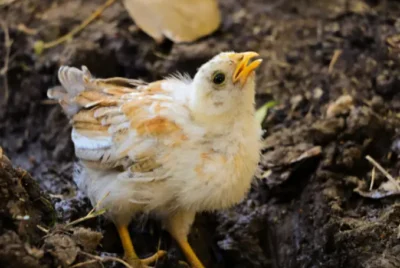How to Use Chicken Manure Properly in the Garden
Are you worried about what might go wrong if you use chicken manure improperly in your garden? Using this valuable resource incorrectly can cause burnt plants, smelly messes and even environmental concerns. But don’t let these worries deter you. In this easy-to-follow guide, we’ll not only show you how to use chicken manure properly but also explain the potential pitfalls to avoid. So, you can enjoy a thriving garden without the headaches and setbacks of improper use.
Can You Put Chicken Manure Directly in the Garden?
No, it’s not advisable to put chicken manure directly in the garden. Fresh chicken manure may contain harmful ammonia. Using it directly can potentially harm or burn your plants and contaminate your garden soil.
To make chicken manure safe and beneficial for your garden, it should be composted or aged first. Composting allows it to break down over time, reducing its strength and killing off pathogens. Once properly composted, you can then use it as a valuable fertilizer to improve soil quality and promote healthy plant growth.
Benefits of Composting Chicken Manure
- Reduced Pathogens. Composting chicken manure helps to kill harmful bacteria, parasites, and pathogens present in raw manure, making it safer for your garden and reducing the risk of plant diseases.
- Weed and Seed Control. Composting, especially hot composting, can prevent weed seeds and undesirable plant seeds from sprouting in your garden, as the high temperatures during composting destroy many of these seeds.
- Odor Reduction. Composting reduces the strong and potentially unpleasant odor of fresh chicken manure, making it more neighbor-friendly and pleasant to work with in your garden.
- Improved Nutrient Balance. Composted chicken manure provides a more balanced and stable source of nutrients and organic matter for your plants. It becomes a slow-release fertilizer, gradually releasing essential nutrients like nitrogen, phosphorus, and potassium over time, which can improve plant growth.
- Enhanced Soil Structure. Composted chicken manure improves soil structure and moisture retention, especially in sandy soils, making it easier for plants to access water and nutrients.
- Environmental Sustainability. Chicken manure compost reduces the environmental impact by preventing nutrient runoff into waterways, which can contribute to water pollution.
- Enhanced Nutrient Accessibility. When you create chicken manure compost tea, you unlock an additional benefit. This nutrient-rich liquid fertilizer, made by steeping composted chicken manure in water, provides a readily available source of nutrients that can be easily absorbed by your plants, promoting healthy growth and lush foliage.
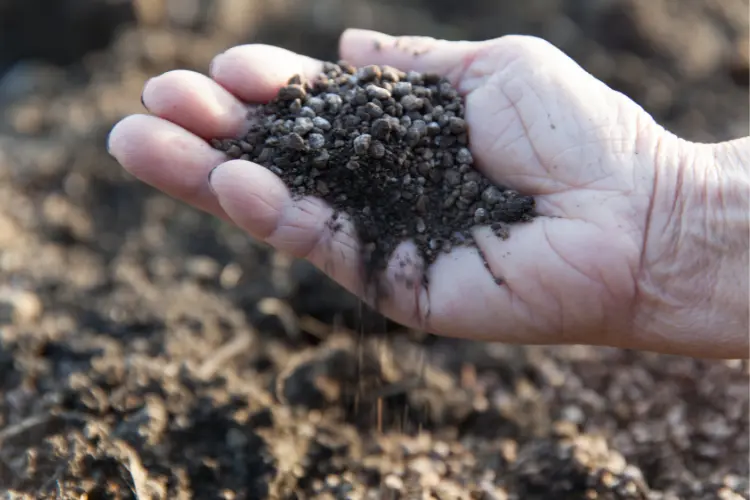
How to Properly Compost Chicken Manure
Hot Composting Chicken Manure
Hot composting is a speedy method to prepare chicken manure for your garden. It involves piling and turning fresh chicken manure regularly to speed up decomposition and ensure safety. The key is to maintain high internal temperatures, which can reach up to 160°F (71°C), as temperatures above 130°F (54°C) kill harmful bacteria.
- Gather Fresh Manure: Collect fresh chicken manure from your coop, avoiding contaminated bedding.
- Layer with Carbon Materials: In a compost bin, alternate layers of chicken manure with carbon-rich materials like straw, sawdust, or dry leaves.
- Maintain Moisture: Keep the pile as damp as a wrung-out sponge by adding water as needed.
- Turn the Pile: Regularly turn the compost pile about once a week to aerate it and ensure even decomposition.
- Monitor Temperature (Optional): Use a thermometer to track the internal temperature; hot composting should reach 130-160°F (54-71°C).
- Aging: Hot composting takes about 5-6 weeks to produce garden-ready compost.
Cold Composting Chicken Manure
Cold composting is a more hands-off approach to aging chicken manure. You create a pile and let it sit and age without frequent turning. This method requires time, with chicken manure typically needing to sit for at least six months before use.
Waiting nine to twelve months further stabilizes the manure and reduces the risk of burning plants. Extended aging also lowers bacteria and pathogen levels to levels similar to hot composting.
Composting in Place in the Chicken Coop
Composting in place is a method where you use carbon-based bedding materials in the chicken coop to help break down and manage chicken waste. This approach reduces the need for frequent coop cleanings, maintains a drier coop environment, and requires less hands-on effort. It’s an excellent option for those with limited space, such as urban or backyard chicken keepers.
- Use Bedding Materials: Utilize carbon-based bedding materials like sawdust, wood shavings, dry leaves, or straw in the coop.
- Litter Management: The bedding materials help break down chicken waste over time, reducing the need for frequent coop cleanings.
- Aging: Over time, the chicken manure in the coop will age and become suitable for use in the garden.
- Regularly Add Bedding: Ensure an adequate supply of bedding materials to continue the composting process.
To learn more about optimizing your chicken coop bedding, including the use of hemp bedding, you can check out our guide on how to use hemp bedding in chicken coops.
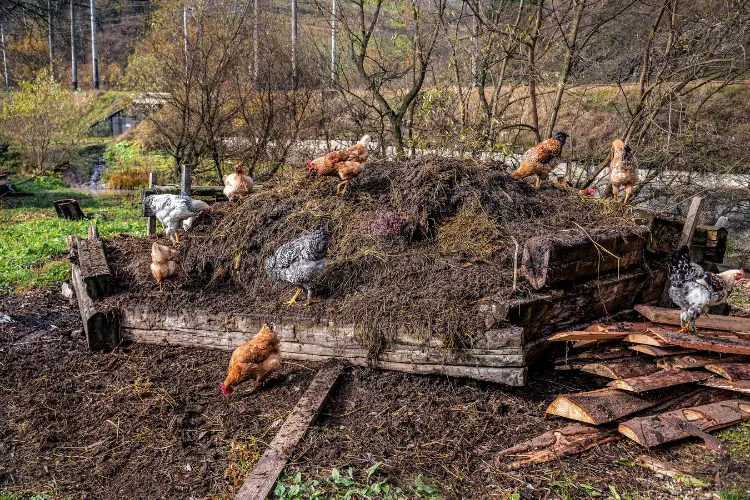
How to Apply Chicken Manure Fertilizer Safely
Garden Fertilizer
When using aged chicken manure fertilizer in your garden, safety and proper application are essential. To apply it safely to your garden, mix the chicken manure fertilizer into the top 10 centimenter of soil at a rate of 5 pounds per 100 square feet. This ensures that the nutrients and organic materials are equally distributed throughout the garden bed. It’s important not to overapply, as excessive amounts can cause to nutrient imbalances and potential harm to your plants.
After application, water the area thoroughly to help the nutrients penetrate the soil. By following these guidelines, you can effectively enrich your garden’s soil with chicken manure fertilizer while ensuring the safety of your plants and the environment.
Read also: The Role of Chickens in Sustainable Pest Management in Gardens
Flowers and Vegetables
Apply the fertilizer at a rate of 2.5 tablespoons per plant, evenly distributing it around the base of each plant. This measured approach ensures that your flowers and vegetable garden receive the necessary nutrients without the risk of overfertilization, which can damage them. Be sure to water the area after applying the fertilizer to help the nutrients integrate into the soil.
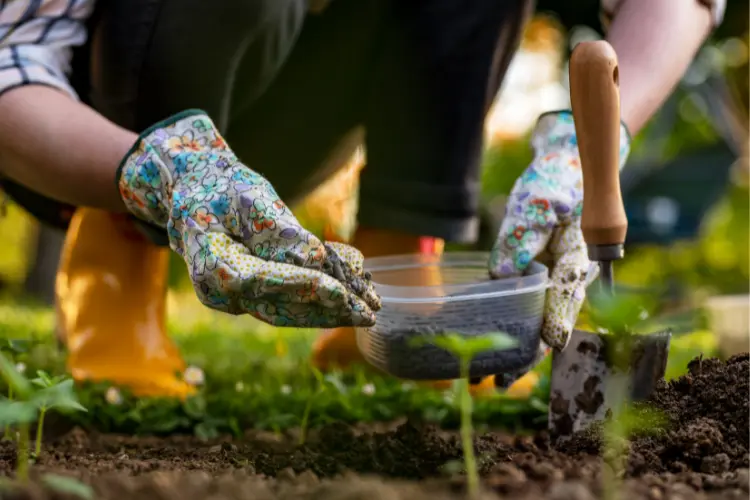
Trees & Shrubs
Determine the diameter of the plant’s branches at the drip line, where rainwater drips off the branches. Apply 1 cup of chicken manure fertilizer per foot of branch diameter around the drip line. For larger plants with diameters exceeding 3 feet, double the amount of fertilizer accordingly. This measured approach provides the necessary nutrients without overwhelming the plants.
Always water the area after applying the fertilizer to help it integrate into the soil. By following these safety guidelines, you can nourish your trees and shrubs effectively, promoting their growth and longevity while minimizing potential risks associated with excessive fertilization.
Safety Tips for Using Chicken Manure
Use Aged or Composted Manure
Only use chicken manure that has been properly aged or composted. This process reduces the risk of pathogens and makes the fertilizer safer for plants.
Wear Gloves and Protective Clothing
When handling chicken poop or working in areas where it’s applied, wear gloves and appropriate protective clothing to minimize direct contact and prevent contamination.
Wash Hands Thoroughly
After handling chicken manure, wash your hands thoroughly with water and soap to remove any potential contaminants.
Apply Manure Well Before Harvest
Apply chicken manure to your garden well before you plan to harvest crops. This allows time for any potential pathogens to break down, reducing the risk of contamination.
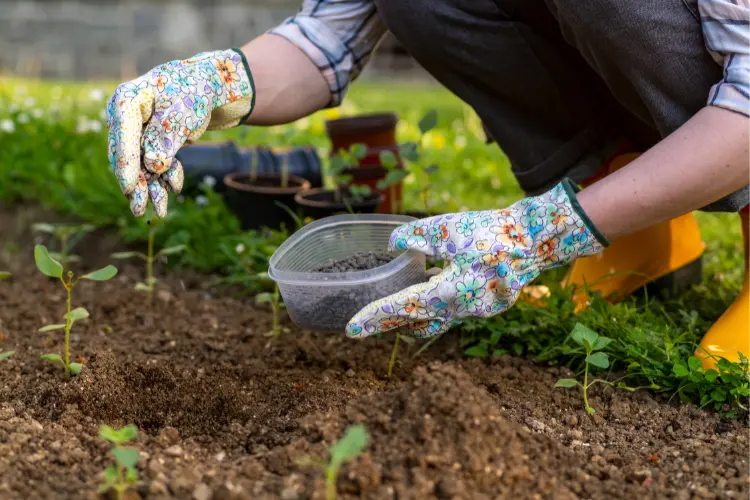
Avoid Direct Contact with Edible Parts
Ensure that chicken manure is not in direct contact with edible parts of plants, such as fruits and vegetables. Apply the manure to the soil surface or mix it into the soil before planting.
Practice Good Garden Hygiene
Maintain good garden hygiene by cleaning tools, containers, and surfaces that come into contact with chicken manure to prevent cross-contamination.
Wash Vegetables Thoroughly
Wash all raw vegetables from manured gardens thoroughly before eating, even if you plan to cook them. This helps remove any potential contaminants.
Consider Vulnerable Groups
Be cautious if you or others in your household are in vulnerable groups, such as pregnant women, young children, or individuals with certain medical conditions. These vulnerable individuals may be more susceptible to foodborne illnesses and should take extra precautions.
Monitor Soil Quality
Regularly monitor the quality of your soil and plants to ensure they are thriving and free from signs of nutrient imbalances or contamination.
Follow Guidelines for Application Rates
Adhere to recommended application rates for chicken manure fertilizer to avoid over-fertilization, which can harm plants and increase the risk of nutrient runoff.
Final Thoughts
Using chicken manure safely in the garden can be a highly effective way to enhance soil fertility and promote robust plant growth. However, it’s crucial to follow a few key guidelines to ensure both the safety of your plants and the health of those who enjoy the harvest. With our guidelines, you can confidently nurture your garden and enjoy the benefits of this natural and valuable fertilizer.

